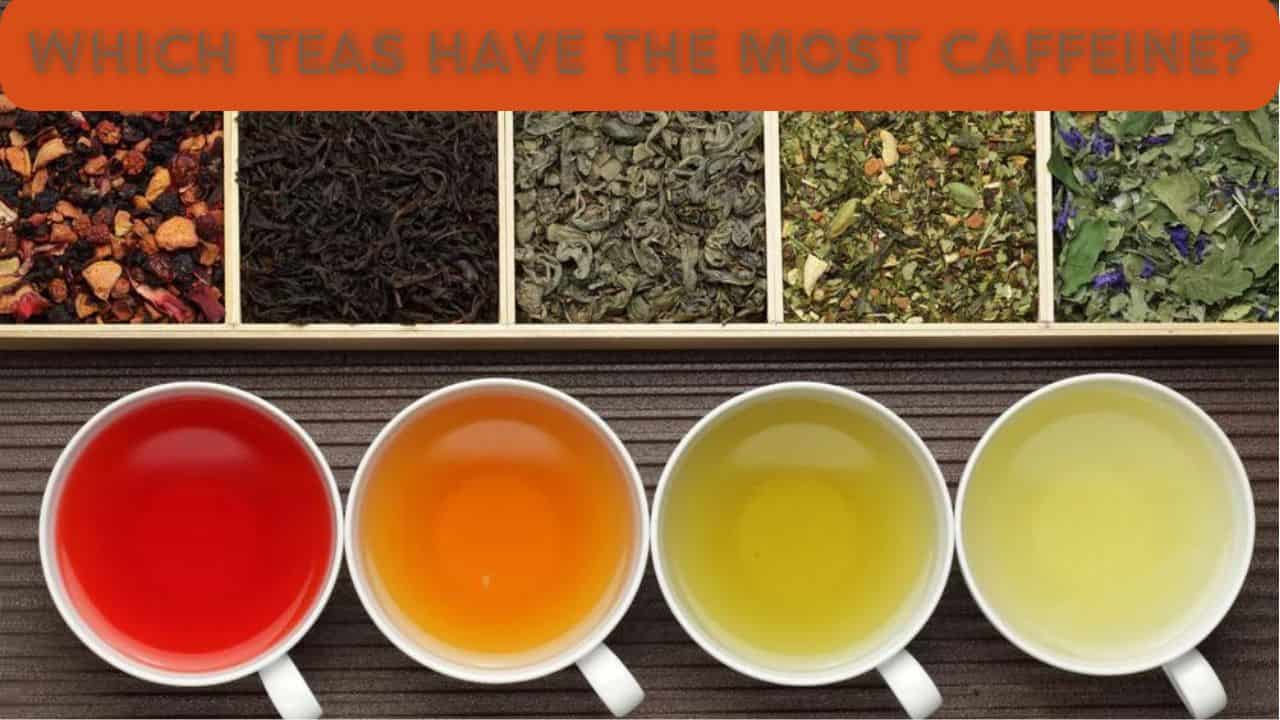Written By: Sherry Harris
Tea is often seen as a gentle, soothing alternative to coffee, but did you know some teas can pack a serious caffeine punch? The caffeine content in tea varies greatly depending on several factors. If you’re someone who enjoys the pick-me-up that comes with a caffeinated drink, you might be curious to know which teas have the most caffeine and why that is. Let’s dive into the world of caffeinated teas and uncover which varieties are the most energizing.
Table of Contents
What Affects Caffeine Levels in Tea?
The amount of caffeine in your tea can depend on a few important factors. From the type of tea leaf to the brewing process, these elements all play a role in how much caffeine ends up in your cup. Which Teas Have the Most Caffeine
Types of Tea Leaves
Different types of tea leaves naturally contain varying amounts of caffeine. Camellia sinensis, the plant from which all true teas are derived, produces both green and black tea, but the caffeine content can differ depending on how the leaves are harvested and processed.
Processing Methods
How tea is processed after harvesting affects its caffeine content. For example, black tea leaves are fully oxidized, which can increase the concentration of caffeine, while green tea is minimally processed, preserving lower levels of caffeine.
Steeping Time and Temperature
The longer you steep your tea, the more caffeine you extract. Likewise, hotter water draws more caffeine from the leaves, so if you’re looking to maximize (or minimize) your caffeine intake, pay close attention to how you brew. Which Teas Have the Most Caffeine
Teas With the Most Caffeine
So, which teas deliver the most caffeine? Below are the top contenders for those looking for an extra jolt in their cup. Which Teas Have the Most Caffeine
Black Tea
Black tea is known for its bold flavor and high caffeine content, making it one of the most popular choices for a morning or afternoon energy boost. Depending on the variety and how it’s brewed, a cup of black tea can have anywhere from 40 to 70 milligrams of caffeine. Its rich, robust taste is often enjoyed with milk and sugar, adding to its widespread appeal.
Matcha Green Tea
Matcha is unique because it’s made from powdered whole tea leaves, which means you’re consuming the entire leaf rather than just an infusion. This results in a higher caffeine content than regular green tea, with a cup containing around 60 to 70 milligrams of caffeine. Matcha also provides a slow, steady release of energy due to its combination of caffeine and L-theanine, making it a popular choice for focused alertness.
Oolong Tea
Oolong tea sits between black and green tea in terms of oxidation, and its caffeine content reflects this balance. With about 30 to 50 milligrams of caffeine per cup, oolong provides a moderate boost of energy without the intensity of black tea or coffee. The flavor of oolong varies greatly depending on the specific type, offering anything from sweet and floral notes to richer, more roasted undertones.
Yerba Mate Tea
Yerba mate is a South American herbal tea made from the leaves of the Ilex paraguariensis plant, and it is renowned for its strong caffeine content. A cup of yerba mate can contain between 70 to 85 milligrams of caffeine, rivaling some of the strongest black teas. Many people enjoy yerba mate for its energizing effects, which are often described as smoother and less jittery than coffee.
White Tea (Surprisingly High)
White tea may have a delicate flavor, but don’t let that fool you—it can contain more caffeine than you’d expect. High-grade white teas, like Silver Needle, can have 40 to 55 milligrams of caffeine per cup, comparable to many black teas. Its caffeine content is influenced by the young, tender tea buds that are used to produce it, which are naturally higher in caffeine.
| Type of Tea | Caffeine Content (per cup) |
|---|---|
| Matcha Green Tea | 60-70 mg |
| Yerba Mate Tea | 70-85 mg |
| Black Tea | 40-70 mg |
| White Tea (Silver Needle) | 40-55 mg |
| Oolong Tea | 30-50 mg |
| Green Tea | 20-45 mg |
| Herbal Teas | 0 mg (caffeine-free) |
| Rooibos Tea | 0 mg (caffeine-free) |
Do You Know?
👉 Does Barley Tea Have Caffeine?
👉 Does Snapple Peach Tea Have Caffeine?
Popular Low-Caffeine Teas
For those who are sensitive to caffeine or just want to cut back, there are plenty of low-caffeine tea options that still offer great flavor.
Herbal Teas
Herbal teas, such as peppermint or chamomile, aren’t technically “teas” because they don’t come from the Camellia sinensis plant. Most herbal infusions are naturally caffeine-free, making them a great choice for those looking to avoid caffeine entirely. These teas are made from a variety of plants, flowers, and herbs, and are often consumed for their calming or medicinal properties.
Rooibos Tea
Rooibos, also known as red bush tea, is a caffeine-free tea alternative that comes from South Africa. It has a naturally sweet and earthy flavor, making it a popular choice for those avoiding caffeine. Rooibos is also rich in antioxidants, adding to its appeal as a health-conscious beverage, perfect for drinking any time of day.
Chamomile Tea
Chamomile tea is another caffeine-free herbal infusion, famous for its calming properties. Made from dried chamomile flowers, this tea is often enjoyed before bed as a natural remedy to promote relaxation and sleep. Its mild, floral taste and lack of caffeine make it a perfect option for those looking for a soothing evening drink.
Health Benefits of Caffeine in Tea
Caffeine in tea comes with several health benefits, especially when consumed in moderation.
Improved Focus and Alertness
Caffeine is well-known for improving focus and alertness by stimulating the central nervous system. In tea, this effect is enhanced by L-theanine, which promotes a calm and focused state of mind. This combination allows tea drinkers to experience enhanced mental clarity without the jitteriness that can accompany other caffeinated drinks.
Antioxidant Boost
Many types of tea, particularly green and white teas, are rich in antioxidants. These compounds help protect the body from oxidative stress and free radicals, which can contribute to chronic diseases. Regularly consuming antioxidant-rich tea can support overall health, potentially reducing the risk of conditions like heart disease and cancer.
How Tea’s Caffeine Affects the Body
Caffeine from tea behaves differently in the body compared to coffee. Tea contains L-theanine, an amino acid that promotes calmness, helping to balance the stimulating effects of caffeine. As a result, the energy boost from tea tends to be smoother and more sustained, without the crash that coffee drinkers often experience.
Recommended Daily Intake of Different Teas
The recommended daily intake of tea varies depending on the type of tea and its caffeine content. Generally, moderate tea consumption is beneficial, but monitoring how much caffeine you consume daily is essential to avoid negative side effects. Here’s a table that summarizes the recommended daily intake of different types of teas:
| Type of Tea | Caffeine Content (per cup) | Recommended Daily Intake |
|---|---|---|
| Black Tea | 40-70 mg | 3-4 cups per day |
| Green Tea | 20-45 mg | 4-5 cups per day |
| White Tea | 40-55 mg | Up to 3 cups per day |
| Oolong Tea | 30-50 mg | 3-4 cups per day |
| Matcha Green Tea | 60-70 mg | Up to 2 cups per day |
| Herbal Tea (Chamomile, Peppermint, etc.) | 0 mg (caffeine-free) | 5-6 cups per day |
| Rooibos Tea | 0 mg (caffeine-free) | 5-6 cups per day |
This table offers an easy reference to manage your tea consumption based on the type and caffeine content. Which Teas Have the Most Caffeine
Conclusion
Tea is a versatile beverage that offers a range of caffeine levels depending on the type, processing, and brewing methods. Whether you’re looking for a strong morning boost or a relaxing evening cup, there’s a tea out there for every caffeine preference. Experiment with different varieties to find the right balance for you.
Whether you’re looking for a caffeine boost or a calming, caffeine-free option, tea offers a wide range of choices. By managing your intake and selecting teas with the right caffeine content for you, you can enjoy tea’s many benefits without overdoing it. Which Teas Have the Most Caffeine
Frequently Asked Questions
1. Which tea has the highest caffeine content?
Among traditional teas, matcha green tea typically has the highest caffeine content because it’s made from powdered whole tea leaves, allowing you to consume the entire leaf. A cup of matcha can contain around 60-70 milligrams of caffeine, which is higher than most other teas.
2. Can tea keep you awake like coffee?
Yes, tea can keep you awake, but its effects tend to be more gradual and sustained compared to coffee. The caffeine in tea, combined with L-theanine, provides a balanced energy boost that enhances focus and alertness without causing the jitters or crash often associated with coffee.
3. Does herbal tea contain any caffeine?
Most herbal teas do not contain any caffeine since they are made from plants, flowers, or herbs rather than from the Camellia sinensis plant, which produces traditional teas like black, green, or white tea. Popular herbal teas like chamomile, peppermint, and rooibos are naturally caffeine-free.
4. How does steeping time affect the caffeine in tea?
The longer you steep your tea, the more caffeine is extracted from the leaves. For example, steeping a black or green tea for a shorter time (around 1-2 minutes) will result in a lower caffeine content, while steeping for longer (over 5 minutes) will extract more caffeine.
5. Is it safe to drink tea every day with caffeine?
For most people, drinking caffeinated tea every day is safe and can even offer health benefits due to the antioxidants found in tea. However, it’s essential to moderate your intake to avoid excessive caffeine consumption, which can lead to side effects like anxiety, insomnia, or an increased heart rate. Experts generally recommend limiting caffeine intake to about 400 milligrams a day, which allows for several cups of tea without issues.

